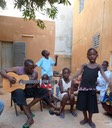The Mande are a widespread West African people speaking closely related languages, with a common historical origin dating back to the founding of the great Mali empire (1235-1469). The Mande “griots” (jeli) are the hereditary musicians and genealogists with a virtuoso repertoire of praise and historical songs that have been passed down orally for centuries within special families. In pre-colonial times the griots were attached to the ruling courts as advisors to kings and warriors, and a system of patronage exists to the present day. Mande griots continue to dominate the musical scene in Mali the featured country in this part of our project.
Not all griot families practise music, but those who do, consider it a duty for their children to be well versed in the griot arts. Performance skills and knowledge of repertoire are picked up informally by rote and osmosis within extended families. Life-cycle events such as weddings and child-naming ceremonies are the main context for performance, apart from television and radio.
There are only two state music schools in the entire country, and music is not part of the state school curriculum. In cities like Bamako, many griot children are learning music by imitating audio and video recordings.
The voice is the most treasured instrument in Mande culture, and the spoken or sung word is considered to have esoteric power. Girls tend to specialize as singers, while boys are taught to play the instruments of the Mande jelis - the kora (a 21 string harp), the balafon (a 22 key xylophone) and the ngoni (a plucked lute with 3-7 strings, the origin of the banjo) and the the tamani (variable pitch drum). Several Mande musicians have a high profile on the “world music” scene, including some of the parents whose children feature in our project, such as Grammy award-winning Toumani Diabate and Bassekou Kouyate.
Lucy Durán
Go to Participants in Mali and Guinea
Go to Films of Mali and Guinea














